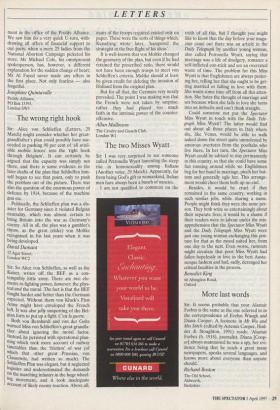Sir: So Alice von Schlieffen, as well as the Kaiser,
writes off the BEF as a con- temptibly little army. There are two ele- ments to fighting power, however: the phys- ical and the moral. The fact is that the BEF fought harder and better than the Germans expected. Without them von Kluck's First Army might have enveloped the French left. It was also jolly unsporting of the Bel- gian forts to put up a fight. C'est la guerre. Both von Bernhardi and von der Goltz warned Miss von Schlieffen's great-grandfa- ther about ignoring the moral factor. Instead, he persisted with operational plan- ning which took more account of railway timetables than the 'friction' of war (of which that other great Prussian, von Clausewitz, had written so much). The Schlieffen Plan was elegant, but it neglected logistics and underestimated the demands 911 the marching infantry in the huge wheel- ing movement, and it took inadequate account of likely enemy reaction. Above all, many of the troops required existed only on paper. These were the sorts of things which, Kesselring wrote later, 'hampered the strategist in the free flight of his ideas'.
It is well-known that von Moltke changed the geometry of the plan, but even if he had retained the prescribed ratio, there would not have been enough troops to meet von Schlieffen's criteria. Moltke should at least be given credit for deleting the invasion of Holland from the original plan.
But for all that, the Germans very nearly prevailed. The point I was making was that the French were not taken by surprise; rather they had placed too much faith in the intrinsic power of the counter- offensive.
Allan Mallinson
The Cavalry and Guards Club, London W1


























































 Previous page
Previous page